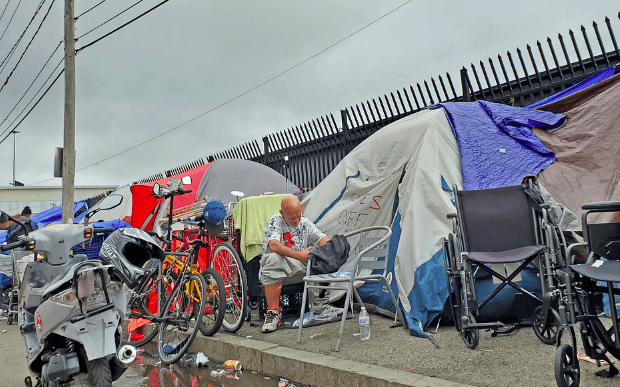Removal of Mass. and Cass encampment long overdue
The op-ed is written by Pioneer’s Charlie Chieppo and the Cicero Institute’s Judge Glock and originally appeared in CommonWealth Magazine.
BOSTON MAYOR Michelle Wu’s plan to clear tents from the Mass. and Cass homeless camping site by January 12 is long overdue. If only it had been done earlier, the move could have averted a humanitarian crisis.
Many believe the encampment has grown merely because the people there lack shelter. The city had claimed it didn’t have enough shelter beds to house the campers, so they left them in place.
Yet the city has ample shelter beds. Boston saw a drop from about 5,500 sheltered homeless before the coronavirus to barely 4,000 in 2021. The city explains these 1,500 empty beds by stating that the homeless were “reluctant to enter shelter” due to the health dangers of the pandemic. Yet these fears cannot have driven the homeless into an encampment, because anyone who has visited one knows these are not places of rigid safety protocols and hygienic cleanliness.
There are two real reasons for the drop in sheltered homeless and consequent increase in the unsheltered. First, the city has been reducing the numbers of shelter beds in active use. Several Boston-area shelters and warming stations reduced capacity because of coronavirus fears. The city also said some of the groups it funds tried to “deconcentrate their dormitories” to reduce transmission of the virus. This was a mistake. While there were real coronavirus dangers, condemning people to life on the streets is worse.
Second, the city has until now refused to enforce the law and push people into shelter even when such beds were available, as they often were. The number of unsheltered homeless increased to 170 early in this year, but the city notes that “very few people asked for, or accepted, rides to shelter” when they were offered.
The simple truth is that the vast majority of people on the streets are what is known as “service resistant,” and do not want shelter. Surveys of campers find that up to three quarters would not go willingly if shelter was offered. This is because, as a recent UCLA study shows, the vast majority of the unsheltered homeless have either a severe mental health disorder or a severe drug or alcohol addiction, and the majority have both.
But the new mayor’s plan doesn’t call for moving people to shelters. Instead, they would go to so-called low-threshold housing, considered the first stage of transitional housing. A recent city survey of people living in the Mass. and Cass encampments found that 95 percent would be willing to leave for such housing, and the locations the city has identified include two hotels and facilities on the Shattuck Hospital campus in Franklin Park. These options mean that the homeless will need only a little encouragement to move into a safe environment.
Leaving severely mentally ill and drug addicted people unsupervised in public places is not humane; it is a recipe for disaster. This has been proven time and again. When Los Angeles began removing camps from its notorious skid row in 2006, it saw homeless deaths drop by half. When it began allowing camps again after 2014, it saw homeless deaths almost triple, to 1,400 a year.
The same tragedy has been playing out in Boston. The Mass. and Cass camp saw 10 stabbings, one shooting, and two murders in a single month this year. Utilizing available shelters is clearly preferable to allowing people in the midst of crisis to kill each other in public.
Preventing camping on public streets is a simple necessity for any urban area to survive and is endorsed across the political spectrum. Citizens in San Francisco and Austin, Texas, two of the most liberal cities in the country, voted to demand bans on public camping, although those cities’ leadership refused to enforce them. Even Los Angeles has walked back its open camping rules and begun enforcement.
Boston should expand access to mental health and drug abuse treatment, but without a camping ban unsheltered homeless people won’t use them. Mayor Wu’s move shows she recognizes that enforcing the existing ban against camping in public places is necessary for the safety of the homeless and for the city at large. The tragedy is that it has taken this long for Boston to act.
Judge Glock is senior policy advisor at the Cicero Institute in Austin, Texas. Charles Chieppo is a senior fellow at Pioneer Institute, a Massachusetts public policy think tank.



